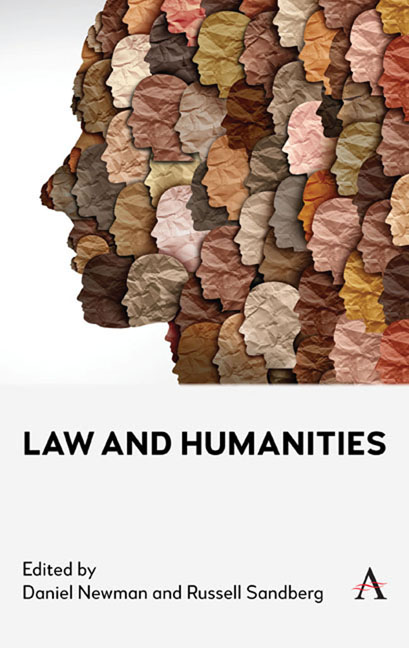Book contents
- Frontmatter
- Contents
- Preface
- List of Contributors
- Chapter One Introducing Law and Humanities
- Chapter Two Law and Archaeology
- Chapter Three Law and Comics/Graphic Justice
- Chapter Four Law and Film
- Chapter Five Law and Geography
- Chapter Six Law and History
- Chapter Seven Law and Literature
- Chapter Eight Law and Philosophy
- Chapter Nine Law and Popular Music
- Chapter Ten Law and Religion
- Chapter Eleven Law and Television
- Chapter Twelve Law and Theatre
- Chapter Thirteen Law and Theology
- Chapter Fourteen Law and Video Games
- Chapter Fifteen Conclusion: Subverting the Law and Humanities Canon
- Index
Chapter Seven - Law and Literature
Published online by Cambridge University Press: 27 March 2024
- Frontmatter
- Contents
- Preface
- List of Contributors
- Chapter One Introducing Law and Humanities
- Chapter Two Law and Archaeology
- Chapter Three Law and Comics/Graphic Justice
- Chapter Four Law and Film
- Chapter Five Law and Geography
- Chapter Six Law and History
- Chapter Seven Law and Literature
- Chapter Eight Law and Philosophy
- Chapter Nine Law and Popular Music
- Chapter Ten Law and Religion
- Chapter Eleven Law and Television
- Chapter Twelve Law and Theatre
- Chapter Thirteen Law and Theology
- Chapter Fourteen Law and Video Games
- Chapter Fifteen Conclusion: Subverting the Law and Humanities Canon
- Index
Summary
Introduction: The Shaping of Law and Literature
The purpose of this chapter is to introduce the study of ‘law and literature’, what it is and what it does. The first part will survey the critical landscape, revisiting the evolution and the associated ‘strategies’ of literary jurisprudence. The second part will then provide an illustrative case study. On this occasion we will indulge a little sorcery.
The interdisciplinary relation of law and literature is hardly new. The merest glance at the writings of Sophocles and Shakespeare confirms this much. The respective fates of Antigone and Shylock have lost none of their resonance down the centuries. The study of ‘law and literature’ as an academic enterprise has, however, assumed a renewed energy over the last couple of generations. Literary jurists commonly date this evolu-tion to the pioneering work of James Boyd White in the 1970s and 1980s, which urged the appreciation that law expresses itself textually, and must therefore be read critically. The better lawyer knows ‘what reading means’. A conclusion famously shared by Stanley Fish, who supposes that the ‘practice’ of reading legal and literary texts should be the same, as both take ‘narrative’ form. Put simply, at its root, reading Milton’s Paradise Lost is no different from reading Donoghue v Stevenson or R (Miller) v the Prime Minister. It is only context that makes the experience feel different.
Here we might contemplate an original, essentially functional, distinction in ‘law and literature’ scholarship: between law as literature, and law in literature. Law as literature invites the lawyer to become a literary critic, to embrace the attendant challenges of textual indeterminacy. Law no longer becomes a matter of truth-seeking but of fashioning impressions. As Richard Rorty famously put it, the ‘strong poet’ is the hero of democracy, interpretive ‘contingency’ its resistance. In practical terms, this means that the literary jurist must also appreciate the skills of the literary critic, hermeneutics, post-structuralism, historical materialism, deconstruction, reader-response theory and so on. Appreciation does not demand approval. But it does require an acceptance that there are different ways of reading everything – albeit the same different ways, for lawyers and everyone else. A conclusion that sits more comfortably with the student of literature, perhaps, than it does the student of law.
And a good point at which to acknowledge a defining characteristic of ‘law and literature’ scholarship, evident from its very inception.
- Type
- Chapter
- Information
- Law and Humanities , pp. 101 - 114Publisher: Anthem PressPrint publication year: 2024



